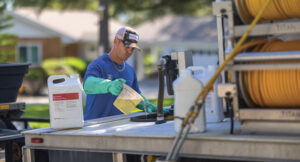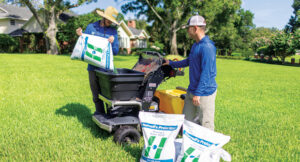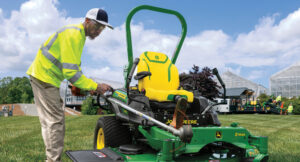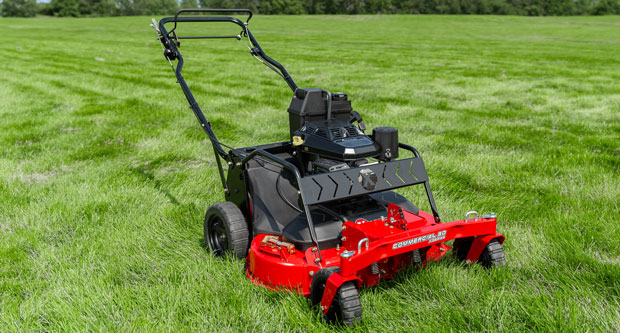Dealers and distributors are a necessary part of the landscaping industry. Beyond the sale of equipment, materials and chemicals, these middlemen and women function as a necessary bridge between the contractor and manufacturer.
In addition, dealers and distributors also try to go beyond the initial transactional relationship of making a quick sale, and their position allows them to serve as a much-needed resource for landscapers needing extra assistance with business planning, equipment help and more.
Because of the extra hand they can lend, it’s important for landscape contractors to build a strong relationship with trusted dealers and distributors. Many industry experts understand that when trust and communication are established in these partnerships, it allows both businesses to thrive.
Landscape Management spoke with dealers, distributors and other industry pros for their best business-boosting tips and tricks on establishing and growing these key relationships.
1. Clear communication
Like any relationship, good communication is an absolute must for success.
“We live in an awesome time where we all have phones and can call or text pretty much instantly anybody we need to get ahold of. But yet, we sometimes don’t do that for whatever reason, and it goes both ways,” says Josh Coffman, commercial and retail sales manager at Everglades Equipment, a John Deere dealer in Florida. “Just being honest, being upfront and forthright with what you’re doing; it’s a simple thing.”
Coffman says that quick, transparent and upfront communication with dealers is important because it allows them to offer the best, most efficient help. It often saves time and headaches down the road as well.
“One thing that we do is a spring parts sale, and we know that’s going to happen every February to the middle of March,” he says. “If the customer is looking to buy a bunch of stuff in April or has talked about buying a bunch of stuff in April and is missing that sale, we would have the awareness to say, ‘Hey, I know in the past you tried to buy later in the season a little closer to end of April. If we can pull that forward, this program is coming out that is going to save you a good bit of money.’ Again, being transparent, having that good communication to give them a better deal on the things that they need.”
Similarly, Samantha Bamaca, director of marketing at Harrell’s — an employee-owned distributor of customized agronomic solutions — says good communication often results in the customer receiving the help they need in the moment and throughout
the entire season.
“When there’s open communication between the customer and the Harrell’s rep, the rep can put together the right plan to help the customer be successful. I’m not sure if all contractors know we can help them in this capacity,” she says. “It’s not always simply about sending over product information.
We really enjoy creating a relationship based on open communication about what our customers are working to achieve in their businesses, what their challenges are agronomically and how we can work alongside them to help them realize their goals.”
Ultimately, it comes down to both parties setting clear expectations and goals to work toward, especially when each contractor has different needs. Jason Coleman, co-owner of Coleman Equipment — a Kubota dealer in Kansas City — says knowing the type of customer he’s working with goes a long way.

“We’ve got customers that are a one-man operation to customers with several hundred or thousands of employees running crews all over the city. We cater to such a vast array of customers that there are different expectations with each type,” Coleman says. “I think it’s really important that any dealership really tries to figure out that customer type so that they’re dealing with them in the best way possible.”
And, of course, when things aren’t working out the way they’re supposed to, don’t be afraid to express that. Coleman says being honest with good feedback can help fix any issues that come up along the way, and it’s something that all parties should be open to.
2. Bridging the gap
One reason vendors are such a crucial resource for landscapers is their ability to work with manufacturers. When product or supply issues appear, dealers and distributors often serve as the missing link to better assist the local end-user.
“Not only do we have great relationships with our customers to help them as trusted advisors, but we also have great relationships with our manufacturer partners,” says Jason Frank, vice president of business development, marketing and R&D at Harrell’s.

“Say there’s a product performance issue. We can bring that manufacturer to the table and say, ‘Help us understand what happened here,’ and potentially fix the situation.”
Frank says it’s important for contractors to understand this aspect of dealerships and distributors because product issues aren’t the only time this relationship comes into play. Vendors can also pass along manufacturer information on deals and promotions to trusted partners.
It’s also important to note that vendors can vary by culture, size and business practices, even when working with the same manufacturer. Contractors should consider picking the right dealer or distributor based on its values and connections.
“I think there are a lot of customers that expect that any and every Kubota dealer is going to be the same. It’s really not,” Coleman says. “It’s about ownership and how the businesses are run because they can be drastically different from each other and between product lines.”
Outside of manufacturer connections, vendors also have contacts with other experts inside their network. Greg Nicoll, vice president, turf sales north at Harrell’s, says when one contractor has an issue, the vendor can connect them with another pro who’s experienced the same problem for help.
“All of a sudden, this beautiful relationship forms,” Nicoll says. “The next thing you know, they’ve known each other for years and they’re going on vacation together. Those are the things that we love to do; just network amongst each other and get people together and have them chat and strategize.”
3. Embrace success
Business ownership isn’t easy, and sometimes it can feel like a dogfight against everyone else to reach the top, or even just to stay afloat. One thing vendors want contractors to know is that they exist to help grow your business.
To fully optimize the partnership, contractors should be open to the idea of working with vendors in times of need and when they have business or product questions. For dealers and distributors, the relationship is symbiotic, meaning both parties hope to grow together. After all, they’re in the service industry just as much as they are the landscape industry.
“We’re not just trying to trade that for a sale. We truly want to be a part of the community and to help (contractors) make their businesses successful so that they can feed their families and they can achieve their dreams,” says Clay Breazeale, vice president of turf sales south at Harrell’s. “That’s really what it’s about. And then, of course, Harrell’s will grow out of that, too.”
Businesses that embrace their vendors will likely find much more than just the products they’re looking for. However, when landscapers aren’t as open, both parties can suffer.
“It hurts (the dealer’s) bottom line because you’re not making as many sales,” Everglades’ Coffman says. “Even more so, and I don’t mean this in an arrogant way, but it almost allows the customer segment to settle for less.”
For him, if communication is poor and certain opportunities aren’t being taken advantage of, contractors don’t always get the best products and tools to do their jobs. Plus, if landscapers don’t view the partnership as one with mutual growth, they may be hesitant to the advice being offered, even if it comes with their best intentions in mind.
4. More than just a sale
For many distributors and dealers, the initial sale is just one small part of their overall strategy to work with contractors. Sometimes, it’s not even a part of it at all.
But other resources and behind-the-scenes work isn’t always apparent to business owners, especially when compared to the shiny machines and mounds of materials out front ready to be bought.
“We continue to invest in research, innovation and business-building resources for lawn care operators, and we hope our customers know that these resources are available to them,” Bamaca says.
Nicoll agreed with this idea, saying it’s important for landscapers to go out of their way to talk about their business needs and goals. If they just take advantage of the bare minimum, they’ll miss out on everything else that’s offered.

“There are a lot of talented (employees) with knowledge here to assist,” he says. “Leverage that relationship because there are a lot of folks here that care.”
Even for landscapers that prioritize just the initial sale, there’s always a bit more to it than the price tag attached to the purchase. When working with the bare minimum, it’s still important for contractors to find the value in what their distributors and dealers can offer.
“We believe as a dealership that we’re here to offer you value beyond just the lowest dollar upfront,” Coleman says. “You’re going to add value to your business in other ways through our parts supply and our level of services and the availability of technicians and things that we have at our service departments and our products that we offer beyond just a piece of machinery, whether it be extended warranties or some of the other products that we’ve built into our offerings that aren’t even added at the manufacturer level.”
5. Be prepared
Even with good communication and an open mind, making the most out of a partnership with vendors is difficult if the contractor isn’t prepared. When making operations as smooth and efficient as possible, the more information available, the better.
Boris Alvarado, South Florida district manager at Heritage Landscape Supply Group, says sometimes getting the contractor what they need without an exact product name or number can be difficult. When there’s missing information, it could lead to consumers getting products that aren’t the best fit.
“I’ll use the iPhone example. I’ll walk in and say, ‘I need an iPhone 15 with a new retina camera … and it’s one terabyte,’ versus the guy that just says, ‘Give me the brand-new iPhone.’ There’s a huge difference between how specific somebody can be in our world.”

Coleman agrees and says providing all the needed information upfront — such as finance contracts, drivers or business licenses and maintenance records — builds the relationship and makes getting help more efficient.
“Customers who can provide us with good, accurate information — just like we would try to provide them with good, accurate information — I think is really important, and it really saves time,” he says. “It really makes for a good relationship.”
Alvarado argues that coming prepared also builds synergy that can speed up future issues, and it helps vendors service their customers better by getting to know them. For example, if a contractor likes certain brands or repeatedly uses a particular kind of product, dealers and distributors will recognize that and be ready to help.
Coffman says proper equipment maintenance can also be a good way to stay prepared. Sometimes, machine issues just happen, but whether a contractor checks their equipment regularly or well past the maintenance light coming on, knowing what issues need to be addressed and what has already been worked on goes a long way in building trust.
“It can be a bone of contention because neither party wants to take responsibility,” he says.
Despite any challenges that might arise, Alvarado says one thing contractors should be prepared for is vendors wanting to work together. And if all goes well, landscapers should have an extra partner to lean on in their careers.

“I wish customers knew how much we actually cared about their business; that we want to form a relationship and not just be transactional,” Alvarado says. “I think that’s a huge thing for me. I wish they knew I want to form a relationship with you. I want to learn everything about you so I can best service you.”
For Breazeale, it all comes down to being ready for those open and honest conversations between vendor and contractor.
“A distributor can’t help a customer be successful unless there’s open communication, and success to a lawn care operator is happy customers and profitability to grow their business. In order for us to help them do that, we need open communication with them so we can help build the best agronomic program that fits into their business,” he says. “When we deal with lawn care operators, that’s the conversation that we want to openly have so that we’re all on the same page and working cohesively with them to move forward.”


